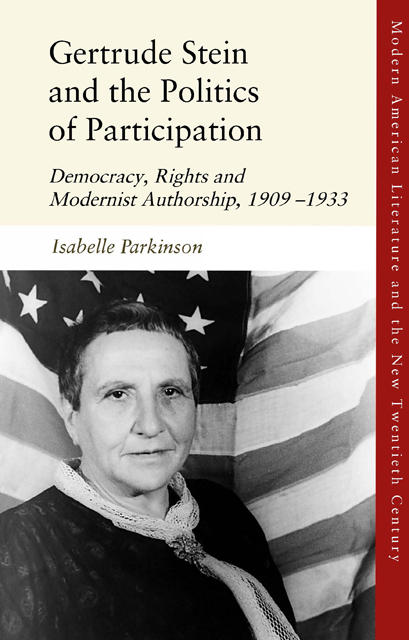 Gertrude Stein and the Politics of Participation
Gertrude Stein and the Politics of Participation Book contents
- Frontmatter
- Contents
- Acknowledgements
- Introduction: Gertrude Stein, Modernism, and Democracy
- Chapter 1 The Politics of Authorship in Three Lives
- Chapter 2 Authorship and Community in Stein’s Pre-war Portraits and Tender Buttons
- Chapter 3 Modernism’s Abject: Geography and Plays and Stein’s Contested Authorship
- Chapter 4 Useful Knowledge and the Mind of Mass Democracy
- Coda: Stein’s Democratic Authorship in The Autobiography of Alice B. Toklas
- Bibliography
- Index
Introduction: Gertrude Stein, Modernism, and Democracy
Published online by Cambridge University Press: 25 April 2023
- Frontmatter
- Contents
- Acknowledgements
- Introduction: Gertrude Stein, Modernism, and Democracy
- Chapter 1 The Politics of Authorship in Three Lives
- Chapter 2 Authorship and Community in Stein’s Pre-war Portraits and Tender Buttons
- Chapter 3 Modernism’s Abject: Geography and Plays and Stein’s Contested Authorship
- Chapter 4 Useful Knowledge and the Mind of Mass Democracy
- Coda: Stein’s Democratic Authorship in The Autobiography of Alice B. Toklas
- Bibliography
- Index
Summary
The pragmatic value of modernism lies in it's tremendous recognition of the compensation due to the spirit of democracy. [ … ] Modernism says Why not each one of us, scholar or bricklayer, pleasureably realise all that is impressing itself upon our unconscious, the thousand odds and ends that make up your sensery every day life. [ … ] Modernism has democratised the subject matter and la belle matière of art, through cubism the newspaper has assumed an aesthetic quality, through Cezanne, a plate has become more than something to put an apple on, Brancusi has given an evangelistic import to eggs, and Gertrude Stein has given us the Word, in and for itself.
The most perfect example of this method is ‘Italians’, where not only are you pressed close to the insistence of their existence, but Gertrude Stein through her process of reiteration gradually, progressively rounds them out, decorates them with their biological insignia [ … ]. They solidify in her words, in ones, in crowds, compact with racial impulses. They are of one, infinitesimally varied in detail, racial consistency.
Modernism and Democracy
Mina Loy's 1924 celebration of Gertrude Stein's work, written in the form of two letters to The Transatlantic Review, reveals a contemporary association of modernism with democracy that has Stein's authorship as the literary exemplar of its democratising force. In Loy's account, modernism is democratic both because of its subject matter and formal experimentation and because of its openness to broad participation. By 1924, definitions of modernism were being formed and contested after more than twenty years of radical practice by a profusion of international artists and writers in European centres and, to a lesser extent, in rapidly modernising American cities. Loy's expression of allegiance shows that Stein's authorship was both produced by and generative of the expansive possibilities of early-twentieth-century Anglo-American literary culture. Stein's significant position on the modernist scene reflected and encouraged an expansion in authorship, notably in her case the proliferation of women writers and of new modes of collective production.
- Type
- Chapter
- Information
- Gertrude Stein and the Politics of ParticipationDemocracy, Rights and Modernist Authorship, 1909-1933, pp. 1 - 35Publisher: Edinburgh University PressPrint publication year: 2023


